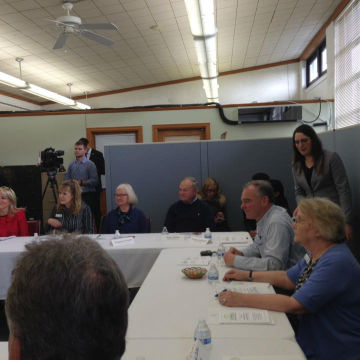Kaine on Meals on Wheels: ‘Incredible value’

The topic: Meals on Wheels, which has become the latest political target of the Trump administration, highlighted after an awkward turn of words from White House budget chief Mick Mulvaney made the headlines.
“Meals on Wheels sounds great,” Mulvaney said, before dropping the axe: “We’re not going to spend on programs that cannot show that they actually deliver the promises that we’ve made to people.”
Meals on Wheels delivers meals to more than 2.4 million seniors nationally, including 53,922 meals for seniors in the Staunton-Waynesboro-Augusta-Highland region, according to Jeri Schaff, the executive director of the Valley Program for Aging Services, which coordinates senior programs in a five-city, five-county region in the Shenandoah Valley and Western Virginia, including the operations of local senior centers in Waynesboro and Staunton.
Recent budget cuts have forced VPAS to close the local senior centers on Fridays, and additional cuts proposed in the first Trump administration budget blueprint promise more in the way of fiscal challenges, locally and across the country.
Kaine convened the roundtable meeting at the Waynesboro Senior Center to learn more about Meals on Wheels and senior services and their impacts on local communities.
Augusta County Board of Supervisors member Tracy Pyles told Kaine about a conversation he had at a recent Craigsville Fire Department fundraising dinner about the impact of Meals on Wheels.
“These folks aren’t just delivered a meal. They’re delivered a smile. They’re delivered companionship,” said Pyles.
That the volunteers delivering meals to homebound seniors are often their only point of contact is key in another respect, according to Schaff.
“As a senior center director, not a week went by where we didn’t have a volunteer say, You know, I’ve been delivering meals to Myrtle for years, and I don’t know, but today something didn’t seem right. Somebody should go check on her,” Schaff said.
But, of course, if you’re a bean counter, looking for measurable, that kind of thing isn’t measurable.
One measurable that shouldn’t be overlooked: the cost that goes into providing a year’s worth of meals through a Meals on Wheels program is equivalent to nine days of nursing home care.
Kaine, talking to reporters after the roundtable, was willing to cut Mulvaney some slack for his phrasing.
“I would like to think that maybe he just put the sentence together wrong, or something, because if there’s any program where the evidence is plain, Meals on Wheels is it,” said Kaine, who has been familiar with Meals on Wheels programs since his days as a member of the Richmond City Council.
“The incredible value that it provides in terms of nutrition, sure, but also getting a volunteer in the house of a senior regularly during the week, not only to check up on the individual, to see if they’re OK health-wise, ease the loneliness a little bit,” Kaine said.
“It would be very foolish to take a program like Meals on Wheels and dramatically slash it. It would tear at the fabric of society in the Valley and all over the country.”
Kaine: Failure of TrumpCare due to constituent response
Phone calls, emails, letters. Congress was flooded with them last week as the House debated the American Health Care Act, the TrumpCare to the Affordable Care Act’s ObamaCare.
The overwhelming response is why the AHCA failed to even score an up-or-down vote.
“What happened last week was a lesson for us all. If you write a letter to your congressman, it does make a difference. If you call your congressman, it does make a difference,” said U.S. Sen. Tim Kaine, meeting with a group of health- and senior-service providers Friday at the Waynesboro Senior Center.
Among those in attendance was Mary Mannix, the president and CEO of Augusta Health, and the chair of the Virginia Hospital and Healthcare Association.
Mannix concedes that the Affordable Care Act “has not been perfect,” citing as a key issue for hospitals the cuts in reimbursements for services provided to the uninsured that have impacted severely on bottom lines.
But while ACA isn’t perfect, AHCA “was an ominous bill for the healthcare sector,” Mannix said.
A key issue with the Republican repeal and replace plan was that it locked in its Medicaid state block grants based on what states are currently committing to Medicaid spending.
Virginia, famously, has resisted, through the political machinations of the Republican-majority General Assembly, expanding its spending on Medicaid, to a point where the Commonwealth ranks 47th among the 50 states in per-capita Medicaid expenditures.
The structure of AHCA would penalize states like Virginia that resisted expanding their Medicaid rolls to cover more of the uninsured.
“AHCA was a step toward a point of no return,” said Mannix, detailing how Augusta Health provides more than $35 million in charity care for uninsured patients in the community annually, and how that figure could only be expected to increase with more people going back off the rolls of the insured.
Kaine visits Wayne Theatre
Pretty cool to sign my name on the wall in Waynesboro's Wayne Theatre. Their program receives NEA funding that would be cut in Trump budget. pic.twitter.com/O7MuDPL3uK
— Senator Tim Kaine (@timkaine) March 31, 2017










